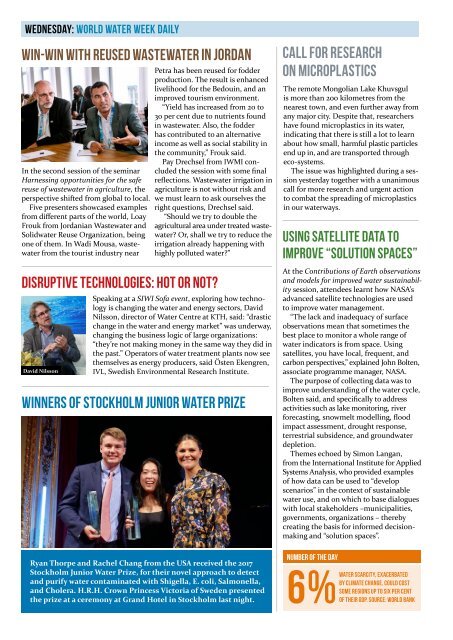2017 WWW Daily Wednesday_30 August, 2017
Create successful ePaper yourself
Turn your PDF publications into a flip-book with our unique Google optimized e-Paper software.
WEDNESDAY: WORLD WATER WEEK DAILY<br />
WIN-WIN WITH REUSED WASTEWATER IN JORDAN<br />
In the second session of the seminar<br />
Harnessing opportunities for the safe<br />
reuse of wastewater in agriculture, the<br />
perspective shifted from global to local.<br />
Five presenters showcased examples<br />
from different parts of the world, Loay<br />
Frouk from Jordanian Wastewater and<br />
Solidwater Reuse Organization, being<br />
one of them. In Wadi Mousa, wastewater<br />
from the tourist industry near<br />
DISRUPTIVE TECHNOLOGIES: HOT OR NOT?<br />
David Nilsson<br />
Petra has been reused for fodder<br />
production. The result is enhanced<br />
livelihood for the Bedouin, and an<br />
improved tourism environment.<br />
“Yield has increased from 20 to<br />
<strong>30</strong> per cent due to nutrients found<br />
in wastewater. Also, the fodder<br />
has contributed to an alternative<br />
income as well as social stability in<br />
the community,” Frouk said.<br />
Pay Drechsel from IWMI concluded<br />
the session with some final<br />
reflections. Wastewater irrigation in<br />
agriculture is not without risk and<br />
we must learn to ask ourselves the<br />
right questions, Drechsel said.<br />
“Should we try to double the<br />
agricultural area under treated wastewater?<br />
Or, shall we try to reduce the<br />
irrigation already happening with<br />
highly polluted water?”<br />
Speaking at a SIWI Sofa event, exploring how technology<br />
is changing the water and energy sectors, David<br />
Nilsson, director of Water Centre at KTH, said: “drastic<br />
change in the water and energy market” was underway,<br />
changing the business logic of large organizations:<br />
“they’re not making money in the same way they did in<br />
the past.” Operators of water treatment plants now see<br />
themselves as energy producers, said Östen Ekengren,<br />
IVL, Swedish Environmental Research Institute.<br />
WINNERS OF STOCKHOLM JUNIOR WATER PRIZE<br />
Ryan Thorpe and Rachel Chang from the USA received the <strong>2017</strong><br />
Stockholm Junior Water Prize, for their novel approach to detect<br />
and purify water contaminated with Shigella, E. coli, Salmonella,<br />
and Cholera. H.R.H. Crown Princess Victoria of Sweden presented<br />
the prize at a ceremony at Grand Hotel in Stockholm last night.<br />
CALL FOR RESEARCH<br />
ON MICROPLASTICS<br />
The remote Mongolian Lake Khuvsgul<br />
is more than 200 kilometres from the<br />
nearest town, and even further away from<br />
any major city. Despite that, researchers<br />
have found microplastics in its water,<br />
indicating that there is still a lot to learn<br />
about how small, harmful plastic particles<br />
end up in, and are transported through<br />
eco-systems.<br />
The issue was highlighted during a session<br />
yesterday together with a unanimous<br />
call for more research and urgent action<br />
to combat the spreading of microplastics<br />
in our waterways.<br />
USING SATELLITE DATA TO<br />
IMPROVE “SOLUTION SPACES”<br />
At the Contributions of Earth obser vations<br />
and models for improved water sustainability<br />
session, attendees learnt how NASA’s<br />
advanced satellite technologies are used<br />
to improve water management.<br />
“The lack and inadequacy of surface<br />
observations mean that sometimes the<br />
best place to monitor a whole range of<br />
water indicators is from space. Using<br />
satellites, you have local, frequent, and<br />
carbon perspectives,” explained John Bolten,<br />
associate programme manager, NASA.<br />
The purpose of collecting data was to<br />
improve understanding of the water cycle,<br />
Bolten said, and specifically to address<br />
activities such as lake monitoring, river<br />
forecasting, snowmelt modelling, flood<br />
impact assessment, drought response,<br />
terrestrial subsidence, and groundwater<br />
depletion.<br />
Themes echoed by Simon Langan,<br />
from the International Institute for Applied<br />
Systems Analysis, who provided examples<br />
of how data can be used to “develop<br />
scenarios” in the context of sustainable<br />
water use, and on which to base dialogues<br />
with local stakeholders –municipalities,<br />
governments, organizations – thereby<br />
creating the basis for informed decision -<br />
making and “solution spaces”.<br />
NUMBER OF THE DAY<br />
6%<br />
WATER SCARCITY, EXACERBATED<br />
BY CLIMATE CHANGE, COULD COST<br />
SOME REGIONS UP TO SIX PER CENT<br />
OF THEIR GDP. SOURCE: WORLD BANK


















